Studio Display review: The Apple monitor for everyone else (who can afford it)
Expert’s Rating
Pros
- Handsome design
- Great image quality
- Impressive spatial audio
- 12MP Ultra Wide camera with Center Stage
Cons
- High starting price and costly upgrades
- No HDR or ProMotion
Our Verdict
As a production display, the Studio Display is an affordable alternative to the Pro Display XDR. Buyers will enjoy it, but you can save a few dollars by going with a non-Apple display.
Best Prices Today
$1599
When Apple discontinued the Thunderbolt Display in June 2016 after a five-year run, it wasn’t pulled off the shelf right away; it stuck around for a few months until its stock ran out. Instead of issuing a new display to replace it, however, Apple worked with LG Electronics and by the end of 2016, the UltraFine 4K and 5K displays went on sale.
So for nearly three years, Apple’s “official” display offerings were the LG UltraFine displays. The LG displays were fine displays (pun intended)—despite an early hiccup with Wi-Fi interference—but the design was typical of any ordinary PC display. Apple’s partnership with LG seemed to focus on the technical aspects of the screen. I’m not downplaying it at all, but one of the reasons Apple customers love Apple products is because Apple’s high-quality design is very appealing.
The LG UltraFine displays were available in the Apple Store and popped up when you bought a Mac mini, but they were something of an afterthought. Before long, we began to think that Apple had no interest in being in the display business at all.
Then in 2019, Apple released the Pro Display XDR, a very expensive standalone monitor sold as an accessory for the reincarnated Mac Pro. Starting at $4,999 without a stand (which costs another $999), it wasn’t a display that even Apple’s most die-hard users could afford to invest in. But its design screamed Apple in every way and we all had the same thought: If only Apple made a version of it for everyone else.
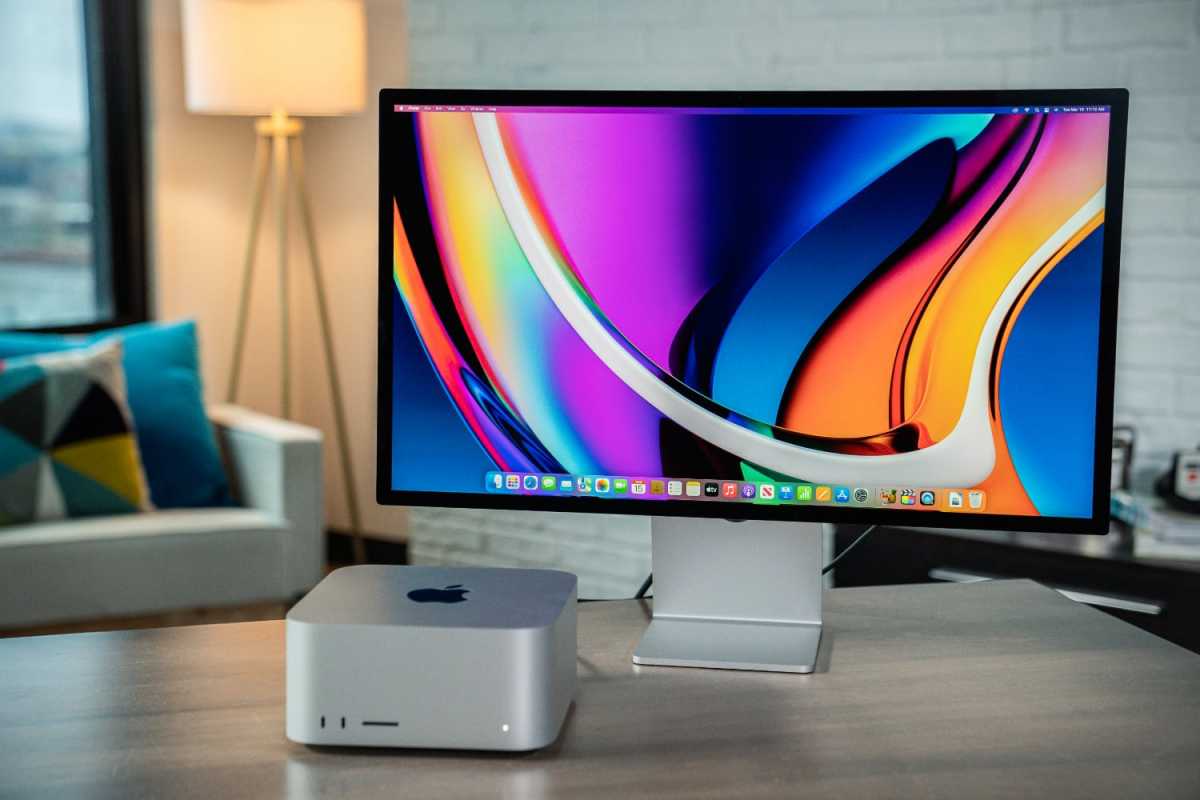
The Studio Display is Apple’s entry into the consumer display market.
Willis Lai/Foundry
That display is here: Studio Display. While it is being marketed very heavily along with the new Mac Studio, it can be used with every Mac Apple sells. Starting at $1,599, the Studio Display is definitely more affordable than the Pro Display XDR, but it’s still expensive, and there are similar displays available at much lower prices.
The question then is, is the Studio Display worth its price? It comes down to how much you value Apple design, image quality, and a key feature of the built-in camera, Center Stage.
iMac without the Mac
The Studio Display is a quintessential Apple design, with a silver case and stand made of aluminum. The 27-inch 5K Retina display itself is skinny, measuring 1.2 inches thick, and it has a thin 0.5-inch black bezel. Overall, the Studio Display with its tilt-adjustable stand is 18.8 inches tall, 24.5 inches wide, and 6.6 inches deep. It stands out next to your typical PC display that’s usually wrapped in black plastic.
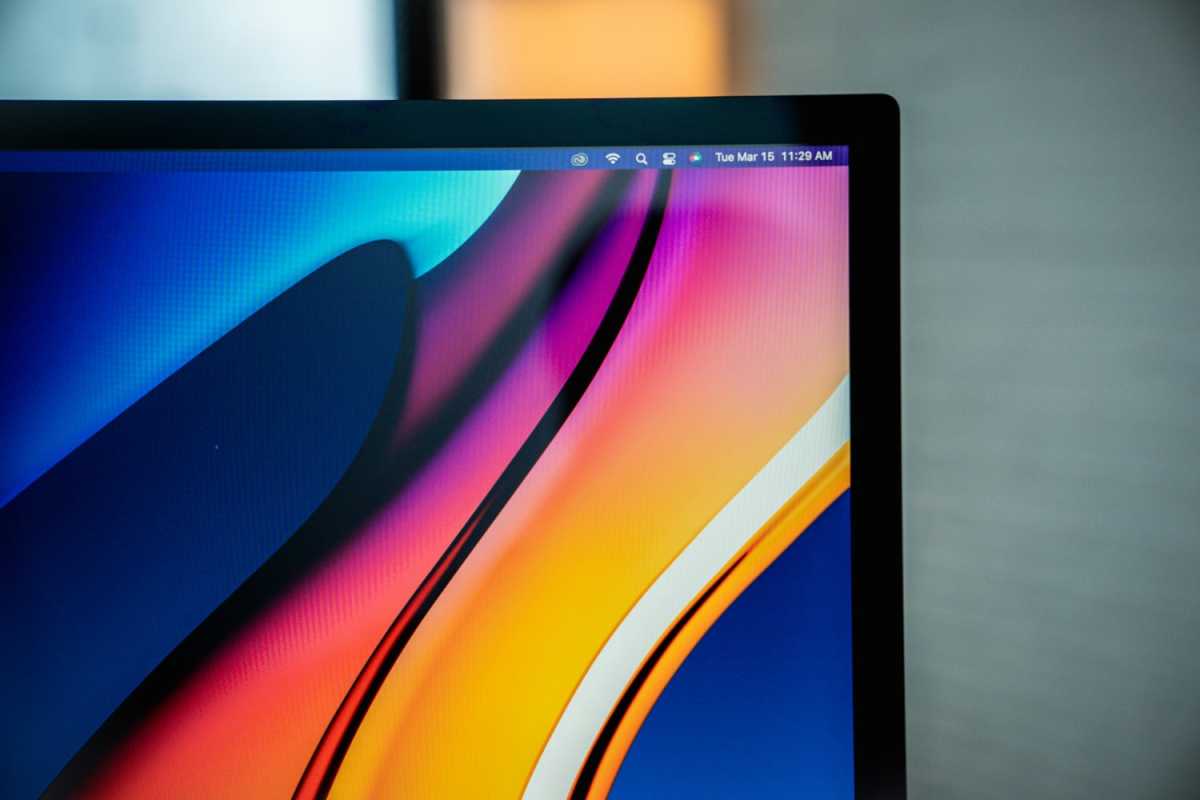
The Studio Display’s black bezels are about a half-inch thick.
Willis Lai/Foundry
In fact, the Studio Display looks like a chinless, larger iMac. Prior to the display’s release, rumors had made their way through the mill that Apple was going to release a new 27-inch iMac or iMac Pro. But no iMac was seen during Apple’s “Peek Performance” event, and the company actually discontinued the 27-inch Intel-based iMac right after it. Maybe the sources of those rumors got the Studio Display mixed up with an iMac.
The Studio Display has a stand that’s tilt-adjustable from -5 degrees downward to +25 degrees upward. The display does not pivot between landscape and portrait modes, like the Pro Display XDR. You can also get a stand that provides about four inches of height adjustment but it doesn’t come cheap. The price tag for the tilt- and height-adjustable stand is a whopping $400 more, raising the price of the Studio Display to cool $1,999. (Keep in mind that the tilt- and height-adjustable stand has a base of 8.1 inches, a bit bigger than the tilt-only stand to properly accommodate the shift in balance when the screen is raised or lowered.)
Apple also sells the Studio Display with a VESA adapter for no extra cost if you’d like to mount it to a wall, use a monitor arm, or have a third-party stand that you prefer. Whatever method you choose, keep in mind that your decision is final—you can’t switch to the tilt- and height-adjustable stand if you decide you want it later.
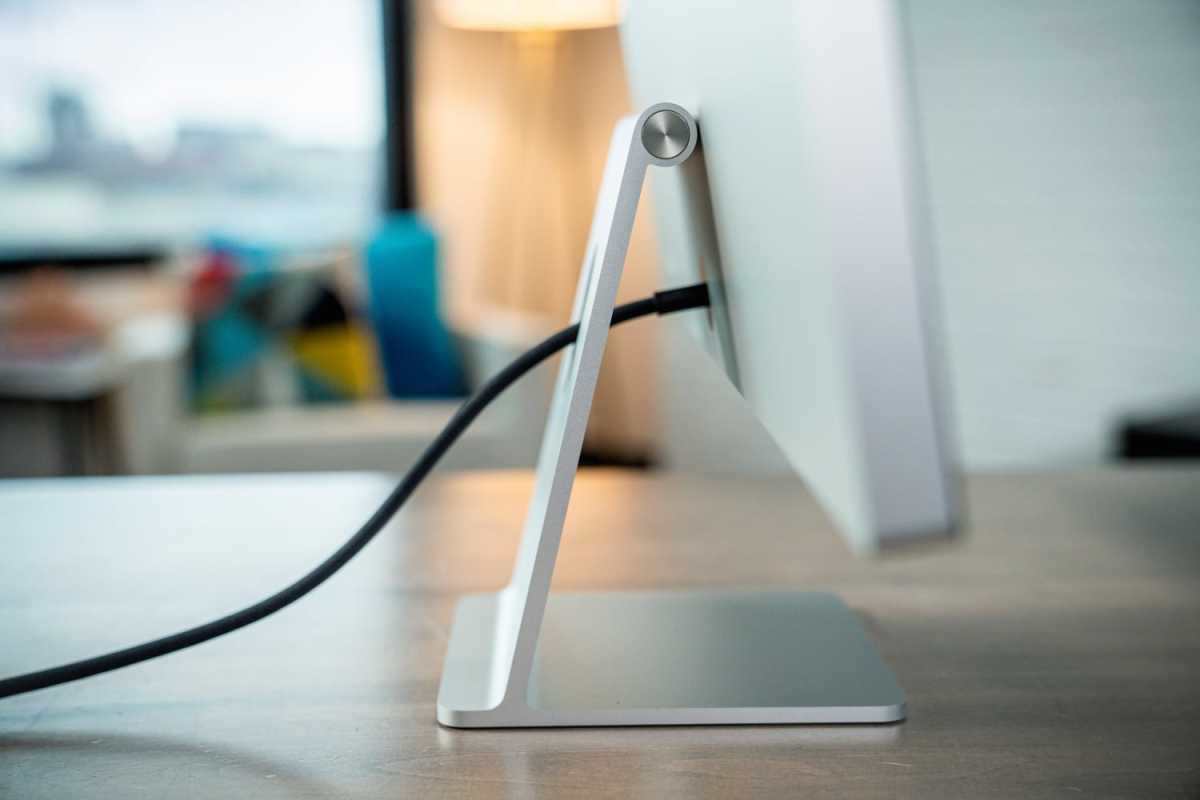
The tile-adjustment stand comes with the $1,599 model.
Willis Lai/Foundry
Sharp but not speedy
The Studio Display has a native resolution of 5120×2880 at 218 pixels per inch. It offers 600 nits of brightness, support for the P3 color gamut, and True Tone. Equally important is the display features the Studio Display doesn’t have: HDR (high-dynamic range), a high-refresh-rate, or ProMotion (the ability to adapt the refresh rate based on what’s being displayed). It also has a lower brightness and contrast ratio than the Pro Display XDR, though you won’t notice that as much.
The display in this review has the standard semi-glossy glass, and the glare is manageable in typical office lighting. If you have punishing lights or technical work that absolutely can’t have glare, Apple offers nano-texture glass, which is a surface similar to what was offered on the 27-inch iMac. When I reviewed the 27-inch iMac in 2020, the review unit was outfitted with nano-texture glass, and the glare from my office lights was practically non-existent. I wrote at the time that it was “oh-so-satisfying,” so it’s probably worth the extra $300 if glare matters to you.
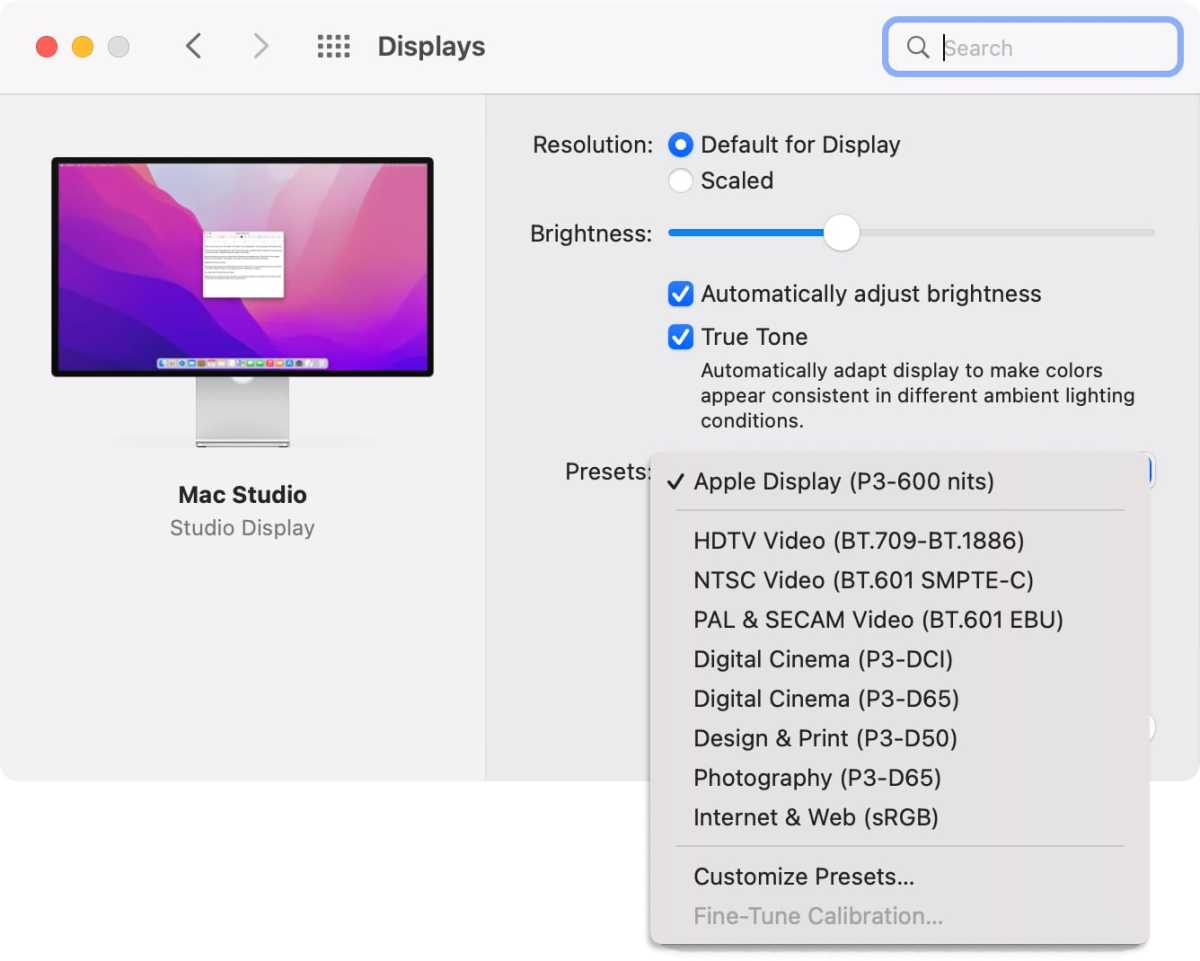
The Studio Display has nine reference modes that can be activated in the Display system preferences.
Apple
Apple displays have always produced very good image quality, and the Studio Display continues that tradition. Colors are rich, contrast is good, and the brightness is suitable for most tasks. I didn’t find any dead or stuck pixels, and the lighting was even throughout the display. It’s a very good display to look at all day long.
An iPhone chip runs the show
Interestingly, the Studio Display has an A13 Bionic System on a Chip, the same chip that was used as the heart of the iPhone 11, second-generation iPhone SE, and the ninth-generation iPad. Why would a display need a processor? There are three very good reasons.
The first is Center Stage. The Studio Display comes with a 12MP ultra-wide camera, like the one on the iPad—Yay!—giving the Mac a camera that’s better than the ones in the iMac and MacBooks. Like the iPads, Center Stage adjusts the camera so you’re always in the center of the frame. It’s a very helpful feature that should have been in the iMac and MacBooks, and works without a hitch on the Studio Display.
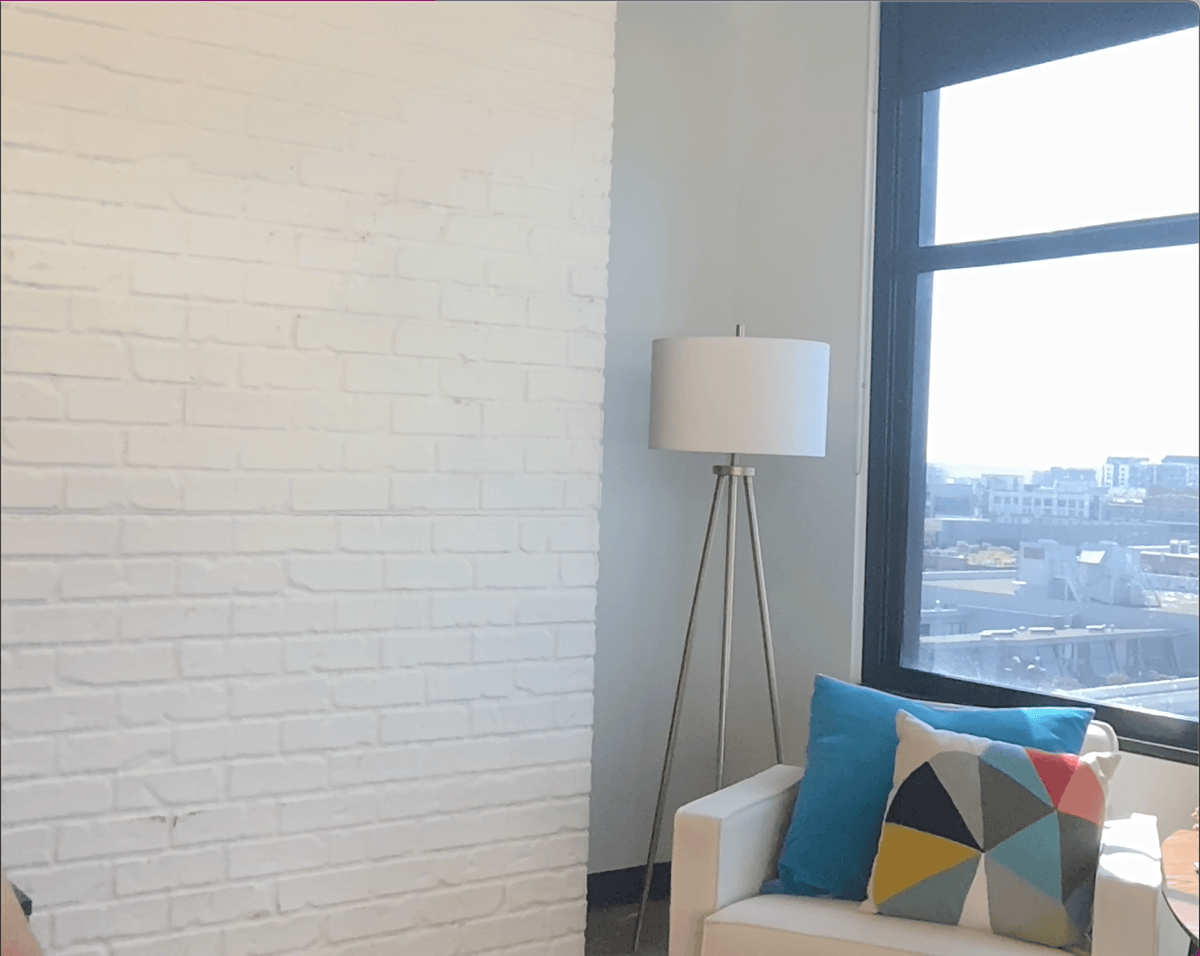
Having a little fun with Center Stage on the Studio Display. (The quality and framerate of this gif is not an indicator of the image quality of the display’s 12MP camera.
)
Foundry
Another reason for the A13 chip: Siri. The Studio Display has a three-microphone array with directional beamforming, so you can ask Siri for help and it will hear you loud and clear. The beamforming also comes into play during video calls and voice recordings, focusing on your voice and not the background noise. In my testing, the display’s mics never missed.
One last A13-related thing: Spatial Audio. The Studio Display has six speakers (four force-canceling woofers, and two high-performance tweeters) that sound better than any display I’ve used. When you’re sitting in front of it, the speakers do an excellent job of immersing you in clean, powerful sound. They work great with video calls, music, and movies, but if you prefer a heavier bass like me, you may want to turn to a third-party external subwoofer.
Those three features seem worthy enough for an A13 Bionic, but we can’t help but think that it’s possible the Studio Display could do even more. Macworld’s Jason Cross thinks the Studio Display would be great as a stand-alone Apple TV player and it technically could except the display doesn’t have any network connectivity built-in. Apple won’t comment on possible upgrades, but there are a lot of interesting possibilities here.
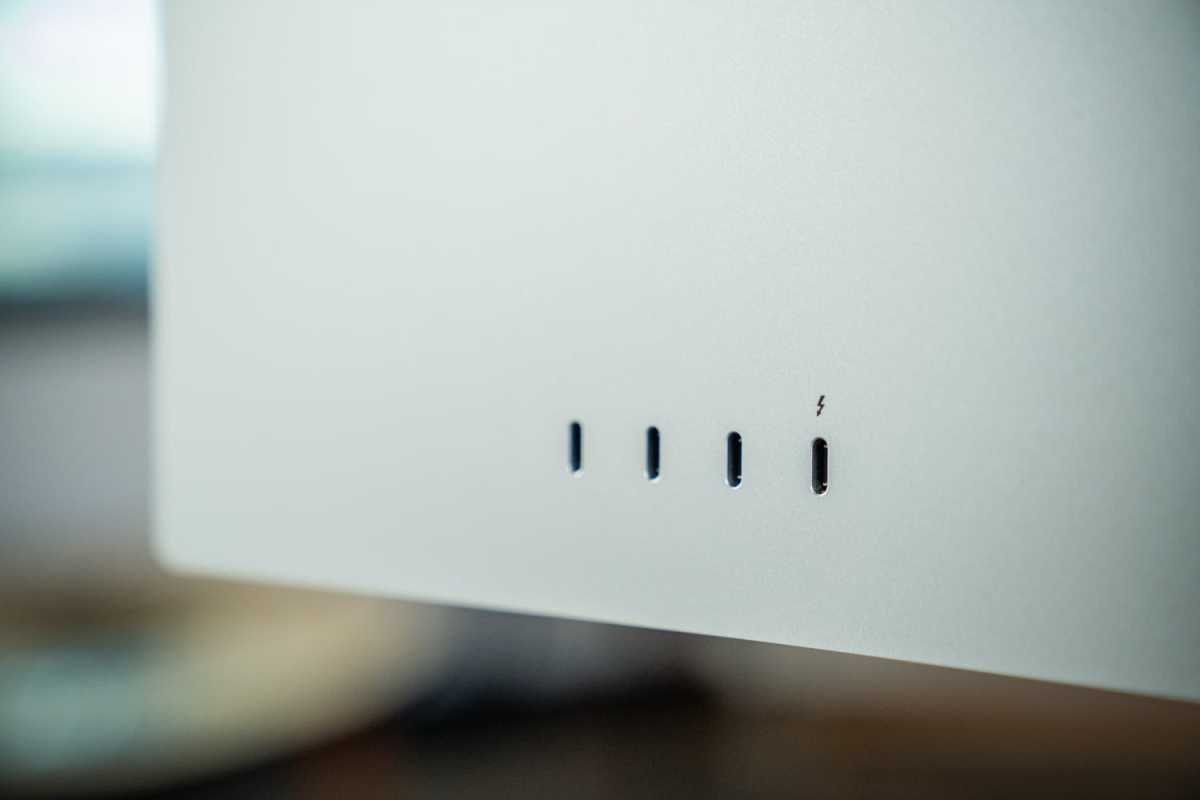
The Apple Studio Display has four ports, one Thunderbolt 3 and four USB-C.
Willis Lai/Foundry
The Studio Display has four ports on the back. The Thunderbolt 3 port connects to the computer, and it can provide up to 96 watts of power, enough to fast-charge a 14-inch MacBook Pro. The other three ports are USB-C for connecting peripheral devices and also provide enough power to charge an iPhone or iPad.
Great design within reach
There’s no question as to the quality of the Studio Display—it’s a great all-around display that’s well-suited for general use and production environments alike. But the question that we started with remains: is the Studio Display worth its price? A display with the standard glass and the tilt-adjustable stand or a VESA mount is $1,599. That’s already a lot, and when you add $400 for the tilt- and height-adjustable stand, and/or $300 for the nano-texture glass, you can pay up to $2,299.
Even at its starting price, $1,599 might be too much for the average Mac user. By comparison, the now-discontinued LG UltraFine display that the Studio Display basically replaced is still available on Amazon for $1,349. You won’t get Center Stage, its webcam isn’t as good, and the UltraFine display’s “speaker” can’t match Apple’s setup. But if you don’t need those things, the “display” part is very similar and it has a tilt- and height-adjustable stand, so you’d save you save $650. There are even cheaper displays as well, but again, they won’t match the quality or features of the Studio Display.
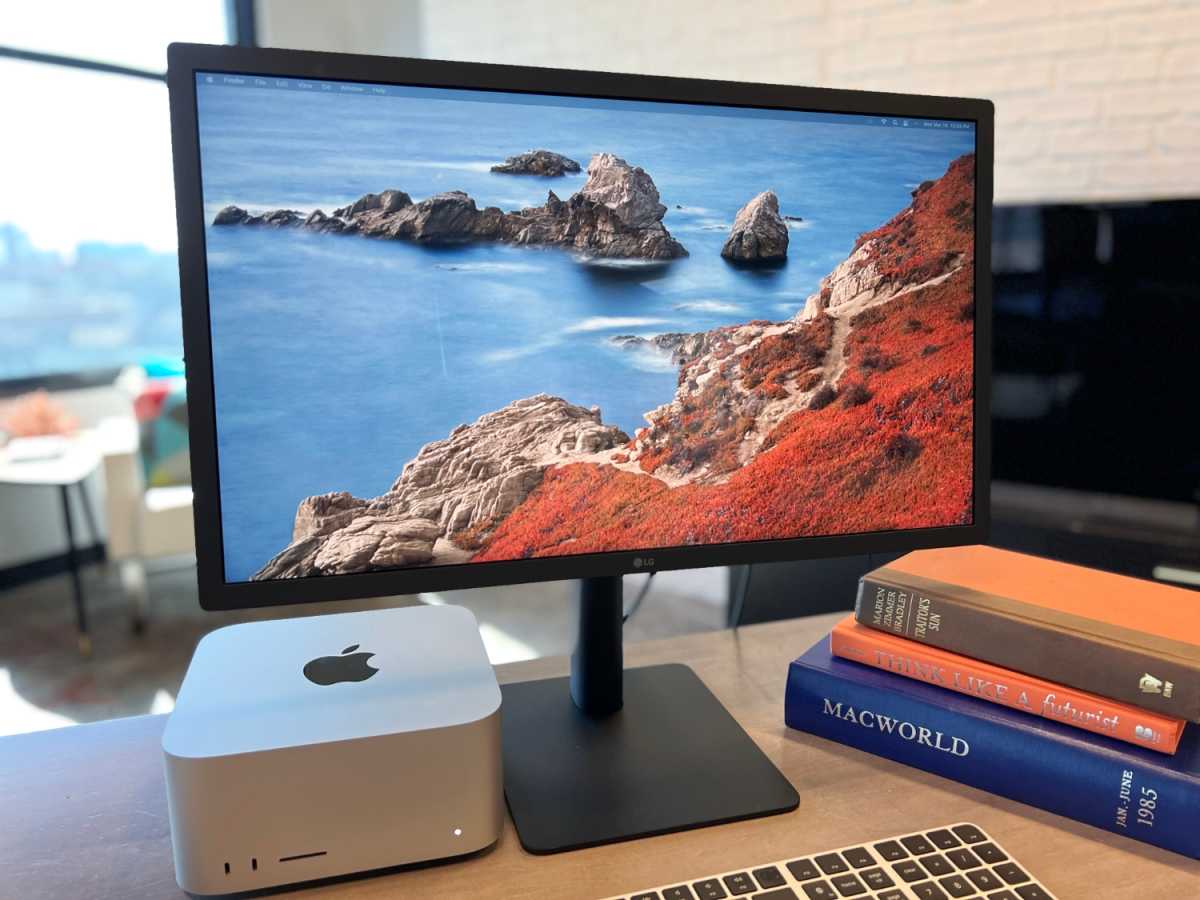
The Mac Studio works just fine with the 24-inch LG UltraFine 4K Display.
IDG
Whether it’s worth the price all depends on what you need and what you want. If you need a production display but don’t have the money for a Pro Display XDR, the Studio Display fits the bill. If you are a general user who makes the occasional videos in iMovie, and does some light photo editing or other creative work, you’ll enjoy the Studio Display, but you can save a few dollars by going with a non-Apple display. If you have to have Apple’s latest design, there’s no substitute.
As for me? I’d probably get something cheaper. But I’d miss Center Stage.
For all the latest Technology News Click Here
For the latest news and updates, follow us on Google News.
